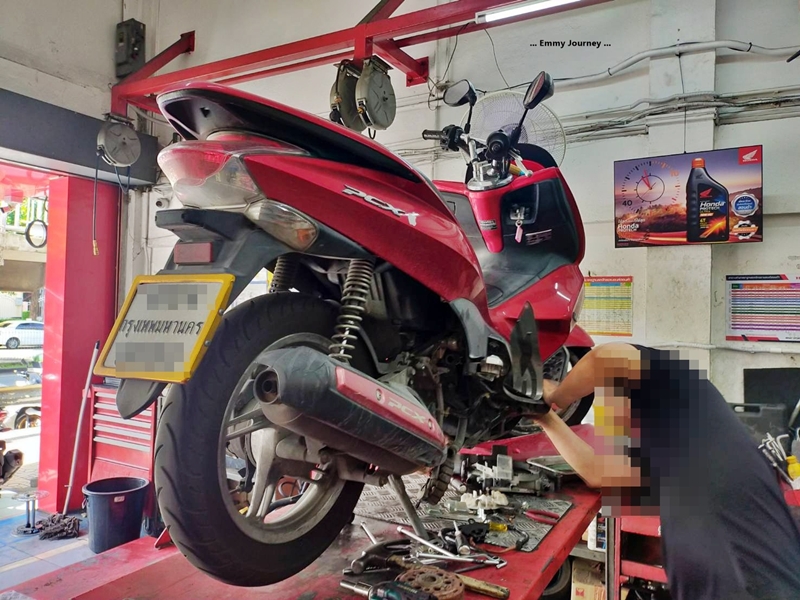5 วิธีถนอมธัมบ์ไดร์ฟสุดรัก ผมเพิ่งได้ธัมบ์ไดรฟ์ตัวใหม่มาใช้ครับ ด้วยความที่ความจุของมันตั้ง 1GB ผมจึงอยากจะรู้วิธีที่จะรักษามันไว้กับผมนานๆ ผมก็เลยนำบทความแนะนำวิธีดูแลธัมบ์ไดรฟ์ที่หาได้จากเว็บไซต์คอมพิวเตอร์ทูเดย์มาให้อ่านกันครับ คอมพิวเตอร์ทูเดย์ระบุว่าภัยที่เกิดขึ้นกับธัมบ์ไดร์ฟโดยรวมๆคือ ธัมบ์ไดร์ฟสูญหาย ธัมบ์ไดร์ฟเสียหายเพราะโดนไวรัส การถูกดูข้อมูลสำคัญโดยไม่ได้รับอนุญาต และข้อมูลในธัมบ์ไดร์ฟสูญหาย วิธีแก้ไขคือ 1. เก็บไว้ใกล้ตัว-ไม่ต้องกลัวหาย นับวันธัมบ์ไดรฟ์จะมีขนาดเล็กลง หายง่ายมาก (ถูกขโมยก็ง่ายด้วย) มีไม่น้อยที่มักจะหลงลืมไว้ตามที่ต่างๆ เวลาหยิบออกมาวาง หรือแม้แต่ติดไปกับเครื่องคอมพ์ชาวบ้านเพราะลืมขอคืน บางคนชอบคล้องไว้กับกุญแจ ซึ่งเป็นของที่ชอบทำหายอันดับต้นๆ วิธีน่าสนใจที่สุดคือ เลือกรุ่นที่มีสายคล้องคอไว้ แม้จะดูไม่สวยงามเท่าไร แต่มันลดโอกาสทำหาย และถูกขโมยได้เกือบ 100% อีกนิดนึง ควรเลือกรุ่นที่สายต่ออยู่กับตัวธัมบ์ไดรฟ์ หลีกเลี่ยงการเลือกใช้รุ่นที่สายคล้องคอผูกกับฝาครอบนะครับ 2. ระวังไวรัส ต้องถือเป็นข้อควรระวังในการใช้งานธัมบ์ไดรฟ์อันดับต้นๆ เพราะโดยพื้นฐานแล้วธัมบ์ไดรฟ์จะมีลักษณะการใช้งานเหมือนกับฟลอปปี้ดิสก์ ซึ่งนั่นหมายความว่า ไวรัสสามารถใช้ธัมบ์ไดรฟ์เป็นสื่อพาหะสำหรับการแพร่กระจายได้เป็นอย่างดี ดังนั้นเวลาใช้งานธัมบ์ไดรฟ์ คุณควรแน่ใจก่อนว่า เป็นการถ่ายโอนเฉพาะไฟล์ข้อมูลเท่านั้น (ไม่ได้ติดไวรัสมาด้วย) ประเด็นที่สำคัญก็คือ ควรแน่ใจว่าคุณกำลังเชื่อมต่อธัมบ์ไดรฟ์กับคอมพิวเตอร์ที่รันซอฟต์แวร์แอนตี้ไวรัสที่ได้รับการอัพเดตสม่ำเสมอ และในกรณีที่คอมพ์ของคุณรันแอนตี้ไวรัส เวลาต่อกับธัมบ์ไดรฟ์ ซอฟต์แวร์แอนตี้ไวรัสในเครื่องคอมพ์จะสแกนธัมบ์ไดรฟ์ให้ด้วย อย่างไรก็ตาม ถ้าไม่แน่ใจธัมบ์ไดรฟ์ที่รับมา ก็ไม่ควรเชื่อมต่อเข้ากับคอมพ์ของคุณเด็ดขาด 3. เข้ารหัสข้อมูล เพื่อรักษาความลับ ถ้าหากธัมบ์ไดรฟ์ของคุณหาย นั่นหมายความข้อมูลของคุณตกไปอยู่ในมือของผู้ที่พบมันด้วย และถ้าหากคนผู้นั้นบังเอิญเป็นคู่แข่งคุณโดยตรง อะไรจะเกิดขึ้น ดังนั้น หากคุณใช้ธัมบ์ไดรฟ์เก็บข้อมูลสำคัญ การเข้ารัหสข้อมูลดูเหมือนจะเป็นเรื่องที่ปฏิเสธไม่ได้ การเข้ารหัสข้อมูล (Encryption) จะทำให้ข้อมูลเปิดอ่านไม่รู้เรื่องจนกว่าจะได้รับพาสเวิร์ดที่ถูกต้อง ซึ่งควรเลือกเข้ารหัสที่ระดับ 128 บิต เพื่อความปลอดภัย ธัมบ์ไดรฟ์รุ่นใหม่ๆ จะมาพร้อมกับคุณสมบัติการเข้ารหัสข้อมูลมาด้วย แต่อย่าลืมตรวจสอบให้แน่ใจนะครับว่า ซอฟต์แวร์ที่ให้มาไม่ใช่รุ่นทดลอง เพราะไม่เช่นนั้น คุณอาจจะต้องจ่ายตังค์ค่าซอฟต์แวร์ในภายหลัง 4. สำรองข้อมูลให้เป็นนิสัย ไม่ปฏิเสธครับว่า เวลาธัมบ์ไดรฟ์หาย เราคงรู้สึกไม่ดีแน่นอน แม้ข้อมูลที่อยู่ในนั้นจะได้รับการปกป้องด้วยการเข้ารหัสไว้แล้วก็ตาม แหม...ก็มันต้องเสียเงินอีกแล้วน่ะสิ แต่มันคงรู้สึกเจ็บใจเป็นสองเท่า หากข้อมูลที่อยู่ในนั้นเราไม่เคยได้ทำแบคอัพสำรองเอาไว้เลย ดังนั้น วิธีที่สุดคือ แนะนำให้คุณสำรองธัมบ์ไดรฟ์ไว้สักสองสามก็อปปี้ เพราะนอกจากพวกมันจะหายง่ายแล้ว ยังเสียง่ายอีกด้วย เนื่องจากธัมบ์ไดรฟ์ส่วนใหญ่จะใช้กรอบเป็นพลาสติก ซึ่งแตกหักได้ง่าย ผมเองขอแถมข้อที่ 5 ไว้อีกข้อนะครับ เป็นข้อที่สำคัญไม่แพ้กัน คือการถอดธัมบ์ไดร์ฟออกจากเครื่องอย่างถูกต้อง เรื่องของเรื่องคือ ก่อนที่คุณจะดึงธัมบ์ไดรฟ์ออกจากพอร์ตยูเอสบีบนคอมพิวเตอร์ ให้คุณปิดโปรแกรมทุกตัวที่มีการเข้าถึงไฟล์ต่างๆบนธัมบ์ไดรฟ์เสียก่อน จากนั้นคลิกไอคอน Safely Remove Hardware (ที่มีลูกศรสีเขียวปรากฎอยู่ในมุมล่างขวาบนทาสก์บาร์) แล้วคลิกเลือกธัมบ์ไดรฟ์ที่ปรากฏอยู่ในรายการ เมื่อคลิกเลือกยูเอสบีไดรฟ์ที่ต้องการเอาออกแล้ว (รูปบน) จะได้รับข้อความแจ้งขึ้นมาว่า Safe To Remove Hardware (รูปล่าง) แปลว่า สามารถดึงธัมบ์ไดรฟ์ออกจากระบบได้อย่างปลอดภัย หลายเสียงยืนยันครับว่า หากถอดธัมบ์ไดร์ฟจากเครื่องปุบปับโดยไม่มีการทำตามขั้นตอนนี้ ธัมบ์ไดร์ฟเจ๊งมานักต่อนักแล้วครับ ทิปจาก ผู้จัดการออนไลน์ Adolescents often receive their facts about puberty from a variety of sources, such as friends, teachers, and the media. When faced with this storm of information, it is important for a girl to be able to turn to someone with whom she feels comfortable talking, who she can trust to provide good advice in most cases, that person is Mom. The transition from childhood to adulthood can be nearly as difficult for parents as it is for their teenage children. Mothers of adolescent girls may find themselves struggling to explain the extensive physical and emotional changes their daughters are going through. To help with the parent-child dialogue, here are some answers to common questions about female puberty: What is puberty? Puberty can be a confusing and awkward time for young women. It is the time in life when a child becomes a young adult and sexual reproduction becomes possible. The easiest changes to identify happen externally. Most children begin to experience large growth spurts around the age of eleven. Girls may notice their waists becoming narrower while their hips grow wider. From ages seven to thirteen, female breasts begin to grow, usually resulting in some soreness. Coarse body air may spring up in the pubic area, the armpits, and other areas. You should be certain to reassure your daughter that all women go through the same changes as they grow. Less obvious, but much more important, are the internal physical changes. Before the signs of puberty even become apparent, hormonal alterations will have been taking place for several years. The hypothalamus in the brain and the pituitary gland begin to send signals to the ovaries. The ovaries then begin to ovulate as they release a mature egg. This egg can either become fertilized and produce a baby, or it will disintegrate and leave the body during the menstrual period. First menstruation, also called menarche, often occurs close to the age of thirteen. This monthly discharge of tissue and blood from the uterus through the vagina is commonly known as a period. This is a sign of a normal, healthy reproductive system. Mothers should take care to prepare their daughters for the arrival of their period by explaining what will occur, why it happens, and how to handle it. When will I get my first period? It is impossible to pinpoint when a girls first menstrual period will occur as it is dependent on hormone levels and physical development. In some cases, girls as young as ten have begun their periods. To prevent embarrassing accidents, teenage girls may want to begin carrying sanitary pads to school with them, in case their period begins while they are away from home. How long will my period last? A typical period lasts anywhere from two to seven days. During a menstrual period, a womans body may gradually discharge up to one-cup of blood and tissue. Over the course of a lifetime, a woman can release 400 eggs and have this many menstrual periods if the ovulations do not lead to pregnancies. Illness or pregnancy can bring a temporary halt to monthly menstrual cycles. A womans periods will eventually stop completely as she reaches menopause around the age of 50-52. What is normal menstruation like? At first, it is normal for adolescents to notice an inconsistent vaginal discharge and an irregular period during their initial menstrual periods, but these periods will eventually become more regular, occurring every 28 days or so. Young women may want to use pantiliners to discreetly cope with any spotting that occurs in the meantime. How do I prepare for my period? Women can track their menstrual cycles using a calendar. Mothers can show their daughters how to mark the first day of their period on the calendar each month and count the number of days until the next period is due. This way, young girls can learn to prepare for their period in advance. Sanitary Napkins vs. Tampons During the menstrual period, girls have the option of using sanitary napkins, also known as pads, or tampons to absorb the flow. Pads are made of a soft, absorbent material that is similar to that of a diaper. They are held into a womans underwear by adhesive backing. In recent years, manufacturers have developed thinner, less conspicuous sanitary pads in an attempt to save women from the embarrassment and hassle of lugging larger pads with them and to make them less conspicuous when they are worn. Tampons are inserted directly into the vagina. Much like an absorbent sponge, a tampon will gently swell as it becomes soaked with blood. A string allows for easy removal from the body. Tampons are convenient for swimming or exercising and can be paired with a pantiliner, a type of thin pad, for extra protection. When using tampons, women should change them every 4-6 hours to minimize the risk of Toxic Shock Syndrome (TSS), a rare, but potentially life threatening reaction to a certain bacterial infection of the vagina, Will my period hurt? It is not uncommon to experience some discomfort during menstruation. The blood flow does not hurt, but women may develop cramps as their uterus contracts. There is some pain from period cramps, but it is not unmanageable. These abdominal cramps vary in intensity and are different for each woman. Some women experience cramping with every period while others never feel anything. It is easy to purchase over-the-counter pain relievers that can help combat this nuisance. For severe period cramps, a doctors consultation may be needed. What is PMS? PMS, or Premenstrual Syndrome, refers to a set of symptoms that many women experience around the time of their menstrual period. Common effects of PMS include: bloating, cramps, fatigue, moodiness, headaches, or pimples. Again, there are over-the-counter medications that can ease these symptoms. To find relief while experiencing PMS, women should try wearing loose clothing or placing warm compresses on their stomach. Mothers can share with their daughters their own tricks for coping. During puberty, many parents will notice a natural tendency in their daughters to seek greater independence but, no matter how much they protest, young women need more support and guidance than ever. Adolescent girls do benefit from having someone they can turn to for support and answers to their questions. By making yourself available to your daughter as a source of emotional and intellectual support, the transition into adulthood will be that much easier on both of you. About STAYFREE? STAYFREE? is a leading producer of feminine hygiene products. New STAYFREE? Dry Max offers a revolutionary QWIK-DRY? Top Layer that traps fluid inside, providing the driest protection yet. For more information, please visit: //www.stayfree.com/index2.html Visit o.b.?Tampons for answers to frequently asked questions to tampon related questions about you childs menstrual period and the CAREFREE? site to learn more about PMS symptoms and period cramps. R.L. Fielding Bio R.L. Fielding has been a freelance writer for 10 years, offering her expertise and skills to a variety of major organizations in the education, pharmaceuticals and healthcare, financial services, and manufacturing industries. She lives in New Jersey with her dog and two cats and enjoys rock climbing and ornamental gardening. This article is copyrighted by STAYFREE?. It may not be reproduced in whole or in part and may not be posted on other websites, without the express written permission of the author, who may be contacted via email at stayfree@digitalbrandexpressions.com ขอบคุณสำหรับบทความดีๆ ครับ....
 โดย: akae
 วันที่: 14 มิถุนายน 2550 เวลา:13:21:31 น. วันที่: 14 มิถุนายน 2550 เวลา:13:21:31 น.ขอบคุณสำหรับความรู้ดีๆำครับ
อ่านแค่ภาษาไทย อังกฤษเดี๋ยวค่อยแวะมาอีกทีครับ โดย: หาดขนง
 วันที่: 14 มิถุนายน 2550 เวลา:15:08:20 น. วันที่: 14 มิถุนายน 2550 เวลา:15:08:20 น.เหอเหอ ของผมมันใกล้จาเป็นน้องเน่าแล้วอ่าครับ
อ่านแล้วเดี๋ยวรีบดูแลซะหน่อย ขอบคุณนะครับ  โดย: toe_knee
 วันที่: 16 มิถุนายน 2550 เวลา:19:38:17 น. วันที่: 16 มิถุนายน 2550 เวลา:19:38:17 น.//9ea33fe3ebe32742054a52c909623c1f-t.nrprql.org 9ea33fe3ebe32742054a52c909623c1f [url]//9ea33fe3ebe32742054a52c909623c1f-b1.nrprql.org[/url] [url=//9ea33fe3ebe32742054a52c909623c1f-b2.nrprql.org]9ea33fe3ebe32742054a52c909623c1f[/url] [u]//9ea33fe3ebe32742054a52c909623c1f-b3.nrprql.org[/u] dd2203050924ab25e877fa6a7f33c0e8
โดย: Jade IP: 190.30.151.217 วันที่: 4 กรกฎาคม 2550 เวลา:6:28:39 น.
|
บทความทั้งหมด
|
 |




 ขอบคุนคับ
ขอบคุนคับ
 ผู้ติดตามบล็อก : 1 คน [
ผู้ติดตามบล็อก : 1 คน [